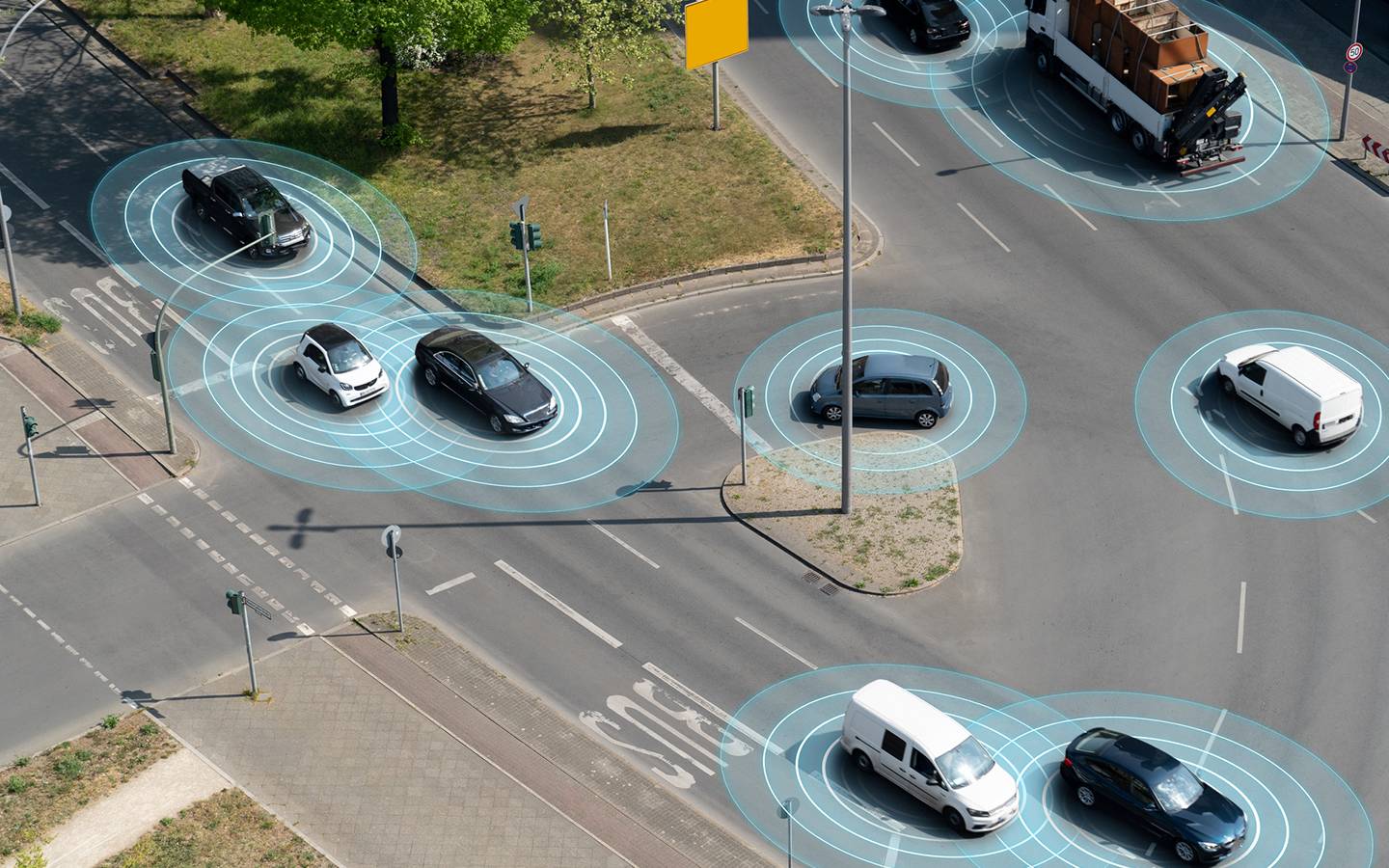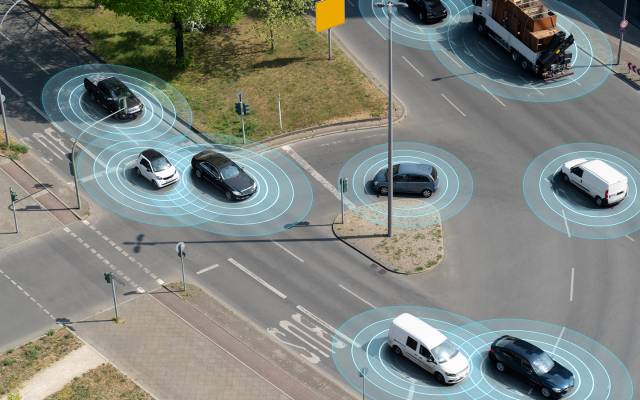Smart transportation has emerged as a critical aspect of reshaping traffic management in modern urban centers. The integration of smart technology enhances road safety, reduces congestion and pollution, and improves travel times. According to a recent U.N. report, approximately one-quarter of global greenhouse gas emissions are caused by the transportation sector.
Smart traffic management encompasses real-time monitoring, predictive analytics, signal control, dynamic route guidance, and enhanced public transportation accessibility.
Advanced technologies—like the Internet of Things (IoT)—form the backbone of the seamless synergy between smart transportation and modern cities, creating a vast network of interconnected devices that enable real-time data exchange. Big data allows municipal planners to make data-driven decisions and conduct in-depth analyses by leveraging the massive amount of information produced by smart transportation systems.
Machine learning further refines these insights, predicting traffic patterns, optimizing routes, and continuously improving the efficiency of transportation networks. The advent of 5G networks provides unprecedented speed and reliability, and a highly responsive and interconnected urban mobility experience. Let’s examine in more detail the revolutionary possibilities that smart transportation brings to urban living.
Smart Transportation: Shaping Urban Living Experiences
By optimizing traffic flow through real-time monitoring and predictive analytics, smart cities can reduce congestion and commute times while enhancing mobility. Intelligent traffic signal controls, dynamic route guidance, and improved public transportation accessibility contribute to seamless urban experiences.
Adopting these innovations reduces the impact on the environment and promotes a more enjoyable urban lifestyle, where residents can move around their cities on bike lanes and roads with ease, improving the community’s well-being.
Impact of Smart Transportation on Traffic Management
The impact of smart transportation on traffic management is pivotal to urban evolution. Beginning with the significance of real-time traffic monitoring, the journey unfolds through predictive analytics, intelligent traffic signal control, dynamic route guidance, public transport, and parking management. Each facet contributes to minimizing costs and environmental footprint, shaping a future where urban mobility is efficient and environmentally conscious.
Real-Time Traffic Monitoring
One of the cornerstones of smart transportation is real-time traffic monitoring. This technology provides smart cities with immediate insights into traffic conditions, allowing for proactive management and timely interventions. Real-time data is essential for swift incident response, traffic flow optimization, and heightened road safety.
By instantly capturing and analyzing traffic conditions, authorities can respond promptly to incidents, rerouting traffic to mitigate congestion and prevent further issues. The result is a dynamic and responsive traffic management system that improves efficiency and prioritizes the safety of commuters on the road and cycle paths. This, in turn, contributes to the efficient functioning of urban road networks.
Predictive Analytics
Predictive analytics takes smart transportation a step further by using historical and real-time data to project future traffic patterns. This proactive approach empowers city planners to implement measures that prevent congestion and improve traffic efficiency.
By forecasting and reducing congestion before it happens, predictive analytics is transforming traffic management. City planners can implement strategic proactive measures—such as adjusting signal timings or suggesting alternative routes, ensuring smoother traffic flow—using the data on hand.
This forward-looking approach improves smart city security, minimizes congestion, reduces commute times, and enhances efficiency in traffic management.
Intelligent Traffic Signal Control
Smart traffic signal systems use advanced algorithms to optimize signal timings based on real-time traffic conditions. Intelligent transportation systems significantly enhance urban mobility by promoting smoother traffic flow, reducing wait times, and optimizing intersection efficiency. Through real-time data analysis and adaptive algorithms, these intelligent transportation systems dynamically adjust traffic signal timings based on current conditions.
This proactive approach minimizes congestion, allowing a continuous and streamlined flow of vehicles. For example, reduced waiting times at intersections lead to improved efficiency, enhancing the commuting experience. Smart technologies not only address current traffic challenges but also pave the way for a more responsive and coordinated transportation network, elevating the quality of urban living through traffic management.
Dynamic Route Guidance
Dynamic route guidance systems use real-time data to analyze current traffic conditions and share optimal routes with drivers. These intelligent systems save time for commuters and reduce overall traffic congestion. By utilizing real-time data and adaptive algorithms, they optimize traffic signal timings.
This strategic approach to traffic control minimizes bottlenecks, allowing a smoother flow of vehicles and eliminating unnecessary delays. Simultaneously, the reduction in congestion leads to less idle time on roadways, lowering the likelihood of traffic jams. The cumulative effect is a more time-efficient and congestion-free urban transportation system, positively impacting both individual commutes and traffic conditions.
Public Transportation Accessibility
Smart transportation systems extend beyond individual vehicles to include public transportation. New technologies and transportation, such as electric vehicles, are a catalyst for transforming public transit and enhancing accessibility, reliability, and efficiency.
Real-time tracking apps and smart scheduling systems give commuters accurate arrival times and route information. Predictive maintenance reduces service disruptions.
Additionally, efficient route planning and fare systems optimize transit operations, making public transportation a more appealing choice for city residents. With technology streamlining services, more people are encouraged to choose sustainable options, contributing to reduced traffic congestion, improved parking space availability, and less environmental impact.
Parking Management and Optimization
Efficient parking management is a critical aspect of smart transportation systems. Through smart sensors and data analytics, cities can optimize parking spaces, reduce traffic caused by parking searches, and enhance the urban parking experience. These intelligent systems provide real-time insights into parking availability, allowing authorities to implement dynamic pricing and innovative strategies to encourage optimal utilization of spaces.
By minimizing the time spent searching for parking, cities reduce traffic congestion, enhance air quality, and improve overall urban movement. This approach aligns with the principles of smart transportation and enhances the urban parking experience for residents and visitors.
Minimizing Costs and Environmental Footprint
Smart transportation solutions not only improve traffic flow but also contribute to cost savings and a reduced environmental footprint. These technologies align with the escalating demand for sustainable urban development. By optimizing traffic flow, reducing congestion, and promoting efficient public transit and parking management, smart transportation technologies contribute to more eco-friendly and resilient urban areas.
Synergy of Technology and Transportation in Smart Cities
Smart technologies are essential in revolutionizing transportation systems within smart cities. The integration of Internet of Things (IoT) devices unravels new dimensions of smart city data collection and analysis. Big data and machine learning have indispensable roles in extracting actionable insights from the vast information reservoirs generated by smart transportation systems. 5G networks redefine connectivity, paving the way for smarter, more responsive transportation networks in the evolving landscape of smart city infrastructure
IoT in Transportation
IoT in transportation enhances connectivity between vehicles, infrastructure, and central control systems. IoT-enabled devices facilitate real-time data exchanges, creating a cohesive network that adapts to dynamic conditions. Vehicles communicate with each other, receive updates from infrastructure sensors, and share information with central control systems. This seamless connectivity enables smarter decision-making, responsive traffic management, and improved efficiency. The result is a transportation ecosystem where real-time insights assist cities with proactively addressing challenges.
Big Data and Machine Learning in Traffic Management
Big data analytics and machine learning are revolutionizing traffic management strategies by advancing data-driven decision-making in smart cities. These technologies extract valuable insights by processing vast datasets from smart transportation systems. Machine learning algorithms analyze patterns, predict traffic trends, and optimize traffic light timings. This data-driven approach allows authorities to implement precise real-time interventions, minimizing congestion and optimizing traffic flow.
The ability to make informed decisions based on real-time and historical data ensures a proactive and efficient response to changing traffic conditions. As a result, smart cities can implement more effective and adaptive traffic management strategies, contributing to a seamless mobility experience in urban areas.
Importance of 5G Networks in Smart City Transportation
The advent of 5G networks is a game-changer for smart city transportation. Faster and more reliable communication technology networks make seamless connectivity and real-time data transfer possible. Offering unprecedented speed and reliability, 5G facilitates communication technology between vehicles, sensors, and control systems. This transformative connectivity ensures real-time data transfer, which helps with swift decision-making and immediate responses to dynamic traffic conditions.
The low latency of 5G enhances the effectiveness of smart city solutions, supporting the growth of interconnected devices and systems. As smart cities embrace 5G, they unlock the potential for a highly scalable and responsive transportation network, where urban mobility is efficient and adaptable, protecting against cybersecurity challenges for smart cities.
Case Study: Smart Transportation in Action
Kansas City, Missouri, serves as a prime example of successful smart transportation implementation according to the U.S. Department of Transportation. Faced with traffic challenges, the city deployed the Smart City Initiative, integrating IoT sensors, data analytics, and real-time monitoring. The installation of smart traffic lights, streetlights, and parking management systems addressed congestion, while a connected bus rapid transit system improved public transport.
Challenges were met with innovative solutions, resulting in a reduction in traffic delays, better parking availability, and a more efficient public transit system. The tangible benefits experienced in Kansas City exemplify how smart transportation solutions can positively impact urban living in the United States. As smart transportation continues to redefine urban living experiences, the synergy between technology and transportation becomes increasingly crucial.
Seagate Offers Secure Data Storage for Smart Cities
Seagate offers secure enterprise data storage solutions tailored for smart city traffic applications. Seagate's private cloud solutions, such as the Exos® E 4U106 JBOD System, Exos CORVAULT™, and Exos E 5U84 JBOD System, offer secure data storage options for smart city traffic applications.
To help manage public cloud data with ease, Seagate’s multicloud-friendly Lyve™ Cloud solution provides a secure and efficient platform for storing and managing smart city transportation data. With its flexible and scalable architecture, Lyve Cloud offers seamless data management across multiple cloud environments, so cities can securely and reliably store and access transportation data.
Seagate specialized solutions, like the Lyve Mobile data transfer service, enable seamless on-vehicle data tracking. This service efficiently transfers enormous amounts of data collected on the road to central data centers or selected cloud storage services, giving timely access to the transportation data needed for smart city initiatives.
By harnessing the power of Seagate’s innovative technology, cities can confidently navigate the complexities of modern transportation networks, ensuring the safety, efficiency, and reliability of their smart city initiatives.
Talk to a Seagate expert about our comprehensive range of secure data storage solutions today for a smarter, more connected urban future.









